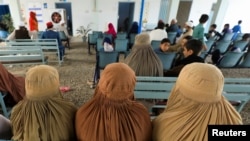Pakistan's caretaker Foreign Minister Jalil Abbas Jilani confirmed Thursday that his government has decided to force out all Afghans and other foreign nationals living unlawfully in the country.
The move will likely affect about 1 million Afghans, including those who took refuge in the country after the hard-line Taliban swept back to power in neighboring Afghanistan two years ago.
The United Nations is alarmed by the plan because it could affect Afghans in need of international protection. Their lives or freedom would be in danger if they were forcefully repatriated, a U.N. official cautioned in background discussions with VOA.
"The new policy approved by the cabinet does not pertain only to Afghans; it is about all those people from different countries who are illegally residing in Pakistan," Jilani told a news conference in Islamabad.
He explained that officially registered Afghan refugees and those living lawfully would not be asked to leave Pakistan. "But those who have come here illegally, whether Afghans or nationals of any country, will have to go back to their respective countries. We will strictly implement the policy."
The spokesperson for the U.N. High Commissioner for Refugees in Islamabad told VOA that his agency was "seeking clarity" from Pakistani counterparts about the new policy.
Qaiser Khan Afridi noted that Pakistan's role as a "generous refugee host for decades" has been acknowledged globally, but more needs to be done to match this generosity. "Any refugee return must be voluntary, without any pressure to ensure protection for those seeking safety," he said.
"UNHCR stands ready to support Pakistan in developing a mechanism to manage and register people in need of international protection on its territory and respond to particular vulnerabilities," Afridi added.
Until the Taliban returned to power in August 2021, Pakistan officially hosted nearly 2.7 million Afghans. That included 1.3 million registered refugees and 880,000 officially documented economic migrants; the rest were declared unlawful migrants.
The Taliban takeover of Kabul triggered a fresh influx of refugees, bringing more than 700,000 Afghans to Pakistan.
An estimated 200,000 have since flown to the United States and European countries under special resettlement programs for their services to U.S.-led international coalition forces, which all chaotically withdrew two years ago after almost two decades of presence in Afghanistan.
Most of the remaining Afghans have either crossed the border into Pakistan unlawfully, or their visas have expired, according to Pakistani officials.
The Taliban have imposed their strict interpretation of Islamic law in Afghanistan since regaining power, placing sweeping restrictions on women.
Girls are not allowed to receive a secondary school or university education. Most female government employees have been ordered to stay home, and female aid workers are forbidden from joining humanitarian groups. Women cannot visit public places, such as parks, gyms and bathhouses, and undertaking long road trips requires the presence of a male guardian.
The restrictions on women are a primary deterrent for Afghans sheltering in Pakistan — particularly women and girls — from returning to their homeland, according to displaced family members.




